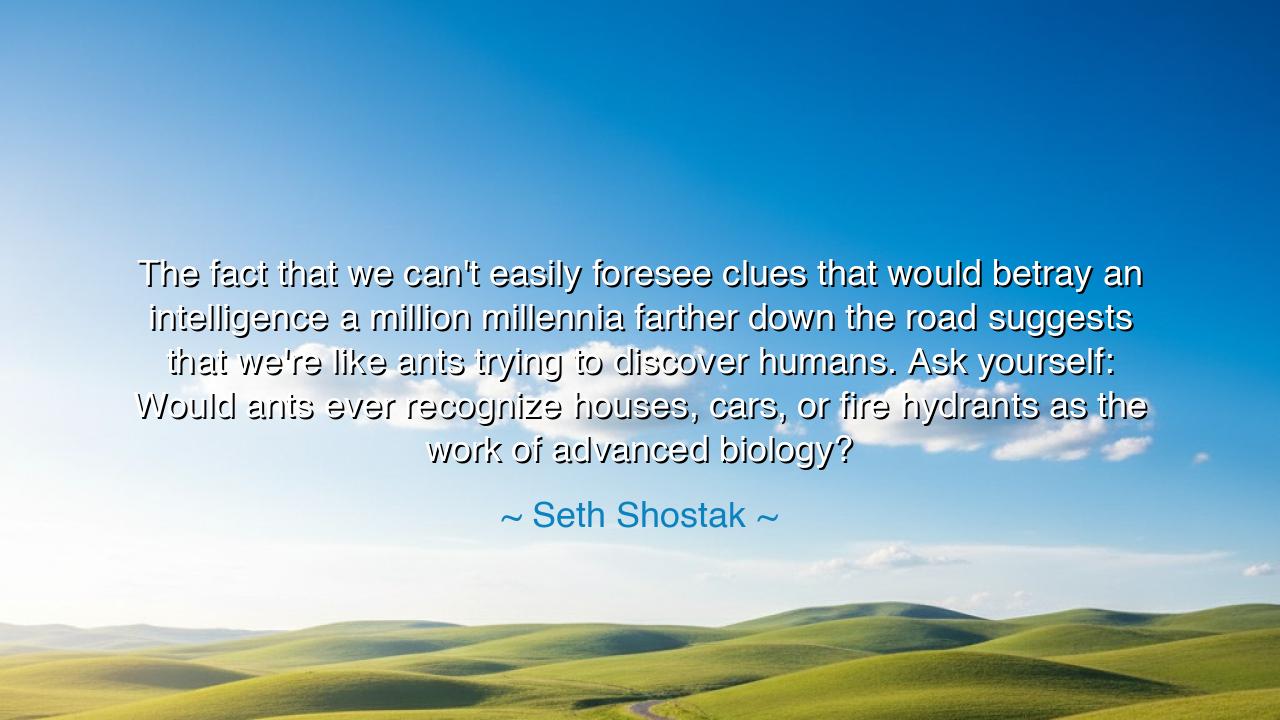
The fact that we can't easily foresee clues that would betray an
The fact that we can't easily foresee clues that would betray an intelligence a million millennia farther down the road suggests that we're like ants trying to discover humans. Ask yourself: Would ants ever recognize houses, cars, or fire hydrants as the work of advanced biology?






“The fact that we can't easily foresee clues that would betray an intelligence a million millennia farther down the road suggests that we're like ants trying to discover humans. Ask yourself: Would ants ever recognize houses, cars, or fire hydrants as the work of advanced biology?” – Seth Shostak
Listen, O seeker of the infinite, to the words of Seth Shostak, astronomer and sage of the modern heavens. In these lines he casts before us a humbling vision of our place in the cosmic order. He speaks of intelligence, that most radiant flame of creation, yet he reminds us how small our own spark still is against the vast night of eternity. When he says that we are like ants trying to discover humans, he invites us to behold the limits of our understanding—to imagine beings so far beyond us in wisdom and evolution that their very works would lie outside the reach of our comprehension. What to us might appear as mere natural phenomena—light, magnetism, the bending of space—could to them be the footprints of their civilization. And yet, to us, such signs would pass unnoticed, like the shadow of a mountain unseen by a creature dwelling in the soil beneath it.
For what Shostak describes is not only the challenge of the Search for Extraterrestrial Intelligence, but the timeless blindness of the finite before the infinite. Just as the ant, absorbed in its labor, cannot perceive the grandeur of the city that towers above it, so too may humanity, with all its science, fail to recognize the signs of minds that have surpassed ours by a million millennia. Imagine, then, the folly of our pride—to believe that the universe must speak in our language, reveal itself through our instruments, or conform to our expectations. The cosmic lesson here is humility: that even as we reach toward the stars, we must remember that we may not yet possess the eyes to see the truth that is already before us.
Consider the history of our own awakening. There was a time when humankind looked upon lightning and called it the wrath of gods, when disease was thought to be a curse and the stars mere candles fixed in the firmament. Only through centuries of struggle did we begin to perceive the deeper laws of nature. And yet, what if even now, as we search the heavens for radio signals and flickering lights, the intelligences we seek are communicating in ways beyond our imagination—through dimensions of existence we have not yet discovered, or through forms of matter that lie beneath the reach of our senses? In truth, Shostak’s analogy is a mirror, reflecting our ignorance back to us, not as shame, but as challenge.
The wise will recognize that this humbling truth is not cause for despair, but for wonder. For if there exist minds so far beyond us that we cannot comprehend them, it means the universe is still alive with mystery. It means that evolution, both biological and intellectual, has no ceiling—that there are heights yet unscaled and realms of understanding beyond our grasp. Just as the ant’s world expands not by denying the human but by surviving alongside it, so too can we expand our knowledge not by assuming supremacy, but by seeking connection—with patience, with curiosity, with awe.
This lesson finds its echo in the story of Galileo Galilei, who first turned his telescope to the heavens and saw moons orbiting Jupiter. The priests and scholars of his day refused to believe their eyes, for it shattered their ordered world. They could not see what was plainly there, not because their vision failed, but because their imagination did. So too, says Shostak, may our instruments already be receiving the signs of greater life, yet our minds, bound by their assumptions, fail to interpret them. The obstacle is not in the stars—it is within ourselves.
Thus, the challenge of this quote is not merely scientific but spiritual. It teaches us that humility is the beginning of wisdom. To seek the truth of the cosmos is to accept our smallness within it. Let us not scorn what we cannot understand, nor assume that our measure of intelligence is the only measure that exists. For every being, from ant to man to god, perceives the universe through the limits of its own design. To acknowledge that limitation is not weakness—it is the first step toward transcendence.
So, my child of the cosmos, let this be your lesson: walk the path of discovery with awe, not arrogance. When you study the stars, remember that you may be like the ant beneath the giant’s foot—blind, yet not without purpose. Continue to seek, not because you believe the universe owes you revelation, but because the act of seeking ennobles the soul. Let curiosity be your compass, and humility your guide. For in the end, it is not the finding that defines intelligence—it is the longing to understand.
And thus, in Seth Shostak’s wisdom, we find both a warning and a promise: that the universe may be filled with intelligences so vast and ancient that we cannot yet recognize them—but also that the very struggle to perceive them is the essence of our own evolution. As ants we may be, yet even ants build kingdoms; and who can say what future awaits the humble mind that dares to look beyond its own horizon?






AAdministratorAdministrator
Welcome, honored guests. Please leave a comment, we will respond soon